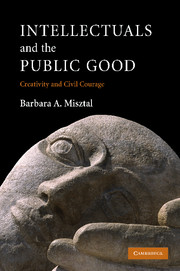Book contents
- Frontmatter
- Contents
- List of tables
- Acknowledgements
- Introduction
- Part I Theoretical framework
- Part II Public intellectuals: the case of the Nobel Peace Prize laureates
- 5 Intellectuals for peace
- 6 Heroes: legends in their own time
- 7 Dissidents: peaceful rebels
- 8 Champions: promoting the cause
- 9 Pioneers: bringing science to politics
- Conclusion
- References
- Index
7 - Dissidents: peaceful rebels
Published online by Cambridge University Press: 22 September 2009
- Frontmatter
- Contents
- List of tables
- Acknowledgements
- Introduction
- Part I Theoretical framework
- Part II Public intellectuals: the case of the Nobel Peace Prize laureates
- 5 Intellectuals for peace
- 6 Heroes: legends in their own time
- 7 Dissidents: peaceful rebels
- 8 Champions: promoting the cause
- 9 Pioneers: bringing science to politics
- Conclusion
- References
- Index
Summary
Intellectuals becoming political
In Bertolt Brecht's play The Land of Galileo, a character says to the scientist who has denied his beliefs to avoid torture: ‘Pity the land that has no heroes.’ To which Galileo replies: ‘Pity the land that needs heroes.’ This exchange illustrates that, while the hero is the man or woman who lets no obstacle prevent him or her from pursuing the ideas he or she has chosen, it is the oppressive context that makes the scientist into the defender of the threatened values. It also helps us to understand why powers that do not encourage a variety of opinions are uneasy with heroic dissidents.
The first dissident, according to William Safire (1993), was the biblical Job, who questioned God's sense of justice, thus endorsing our rights to make demands on unjust authority and making us morally obliged to hold those in power accountable. Socrates, Jesus Christ and Galileo Galilei are frequently mentioned as ones who courageously defended their convictions. The British Enlightenment in the late eighteenth century, according to Roy Porter (2001), was characterised by a vibrant culture of dissent, with dissenting academics offering alternative ideas to the prevailing orthodoxies. The impact of dissidents such as Tom Paine and, later, intellectuals such as John Stuart Mill and R. H. Tawney was crucial in defining the core principles of public life, namely tolerance, diversity, pluralism and civic consciousness.
- Type
- Chapter
- Information
- Intellectuals and the Public GoodCreativity and Civil Courage, pp. 153 - 180Publisher: Cambridge University PressPrint publication year: 2007



